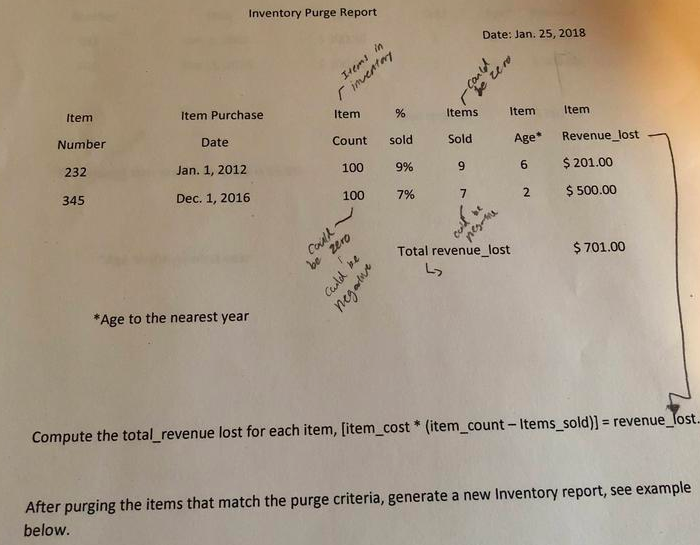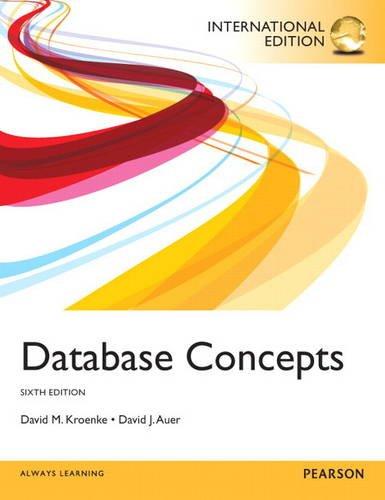Question
I'm working on a program that reads a series of data records from a file(screenshot of file below) and stores each record in a linked
I'm working on a program that reads a series of data records from a file(screenshot of file below) and stores each record in a linked list in ascending order by items number and then prints the report.
I need to edit my program to input a list of item numbers from a file(it will be called purge_items.dat) and from those item numbers listed in the file, I'm to delete the item record if the corresponding item's age is MORE than 5 years old AND the items sold is LESS than 10% if the item_count. However, if the item number is NOT listed in the list from the supplied file, ignore it and go on to the next item number from the purge_items.dat file.
Once that is done, generate a report in a separate file(let's call it "inventory_purge_report.txt") titled "Inventory Purge Report" that looks like the image below
titled "Inventory Purge Report" that looks like the image below
My current is code is below which you can modify
#include
#include
#include
#include
#include
#include
using namespace std;
struct InventoryReport
{
int Item_Number;
string Item_Category;
int mm;
int day;
int year;
float itemCost;
int itemCount;
int itemsSold;
InventoryReport *next;
};
void insert(InventoryReport*& Head, InventoryReport * itemPntr)
{
InventoryReport* prev = NULL;
InventoryReport* curr = NULL;
//If head is empty.
if (Head == NULL)
{
Head = itemPntr;
}
//Compares item numbers at head of list.
else if (Head != NULL && Head->Item_Number > itemPntr->Item_Number)
{
itemPntr->next = Head;
Head = itemPntr;
}
//If the new item number is less than head item number.
//Compares and adds item in middle of list.
else
{
curr = Head;
while(curr != NULL)
{
if (curr->Item_Number > itemPntr->Item_Number)
{
prev->next = itemPntr;
itemPntr->next = curr;
break;
}
prev = curr;
curr = curr->next;
}
//Item placed at end of list.
if(curr == NULL)
prev->next = itemPntr;
}
}
string get_month( int month_number){
string month;
switch (month_number)
{
case 0: month = "error";
break;
case 1: month = "Jan.";
break;
case 2: month = "Feb.";
break;
case 3: month = "Mar.";
break;
case 4: month = "Apr.";
break;
case 5: month = "May";
break;
case 6: month = "June";
break;
case 7: month = "July";
break;
case 8: month = "Aug.";
break;
case 9: month = "Sep.";
break;
case 10: month = "Oct.";
break;
case 11: month = "Nov.";
break;
case 12: month = "Dec.";
break;
default: // code to be executed if n doesn't match any cases
month = "error";
}
return month;
}
void print(InventoryReport * Head)
{
ofstream outF;
outF.open("InventoryReport.dat");
float totalRevenue = 0;
//Pointer for date.
time_t t = time(NULL);
tm*timePtr = localtime(&t);
int sub2 = timePtr->tm_mon + 1;
string month = get_month(sub2);
//Print to screen.
cout
tm_mday - 1)
tm_year)+1900
cout
cout
cout
//Print to file.
outF
tm_mday - 1)
tm_year)+1900
outF
outF
outF
InventoryReport * node1 = new InventoryReport;
node1 = Head;
int tMonth = timePtr->tm_mon + 1; //month since january, march would be 2, add 1.
int tDate = timePtr->tm_mday;
int tYear = timePtr->tm_year + 1900; //year since 1900, 2008 would be 108
while (node1 != NULL)
{
//Calculate age of item.
// couttm_year) + 1900year
int years = tYear- node1->year;
float itmRevenue = node1->itemCost*node1->itemsSold;
totalRevenue += itmRevenue;
//if(node1->mm tm_mon) + 6)
int months=tMonth-node1->mm;
int sub = node1->mm;
string month = get_month(sub);
//Print to screen.
cout Item_Number
cout day
year;
cout itemCost
itemsSold
//Print to file.
outF Item_Number
outF day
year;
outF itemCost
itemsSold
node1 = node1->next;
};
//Print to screen.
cout
cout
//Print to file.
outF
outF
outF.close();
}
int main()
{
ifstream inF;
inF.open("item_file.txt");
InventoryReport * newNode = NULL;
InventoryReport * Head = NULL;
//Read in data from file.
while (!inF.eof())
{
newNode = new InventoryReport;
inF >> newNode->Item_Number;
inF >> newNode->Item_Category;
inF >> newNode->mm;
inF >> newNode->day;
inF >> newNode->year;
inF >> newNode->itemCost;
inF >> newNode->itemCount;
inF >> newNode->itemsSold;
insert(Head, newNode);
}
InventoryReport *temp = Head;
print(Head);
inF.close();
return 0;
}
Inventory Purge Report Date: Jan. 25, 2018 in Item Purchase Item % Items Item Item Item Count sold Sold Age Revenue lost Date Jan. 1, 2012 Dec. 1, 2016 Number 6 201.00 2 $500.00 100 9% 232 345 100 7% Total revenue lost $701.00 *Age to the nearest year Compute the total_reven ue lost for each item, [item_cost *(item_count-Items_sold)] revenue fost. After purging the items that match the purge criteria, generate a new Inventory report, see example below
Step by Step Solution
There are 3 Steps involved in it
Step: 1

Get Instant Access to Expert-Tailored Solutions
See step-by-step solutions with expert insights and AI powered tools for academic success
Step: 2

Step: 3

Ace Your Homework with AI
Get the answers you need in no time with our AI-driven, step-by-step assistance
Get Started


